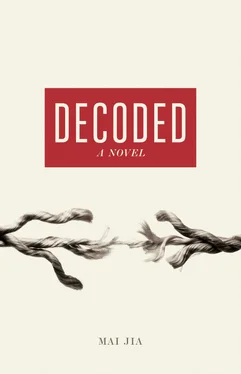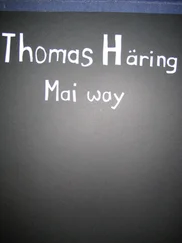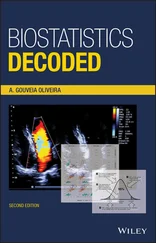Mai Jia - Decoded
Здесь есть возможность читать онлайн «Mai Jia - Decoded» весь текст электронной книги совершенно бесплатно (целиком полную версию без сокращений). В некоторых случаях можно слушать аудио, скачать через торрент в формате fb2 и присутствует краткое содержание. Год выпуска: 2014, Издательство: Allen Lane, Жанр: Современная проза, на английском языке. Описание произведения, (предисловие) а так же отзывы посетителей доступны на портале библиотеки ЛибКат.
- Название:Decoded
- Автор:
- Издательство:Allen Lane
- Жанр:
- Год:2014
- ISBN:нет данных
- Рейтинг книги:3 / 5. Голосов: 1
-
Избранное:Добавить в избранное
- Отзывы:
-
Ваша оценка:
- 60
- 1
- 2
- 3
- 4
- 5
Decoded: краткое содержание, описание и аннотация
Предлагаем к чтению аннотацию, описание, краткое содержание или предисловие (зависит от того, что написал сам автор книги «Decoded»). Если вы не нашли необходимую информацию о книге — напишите в комментариях, мы постараемся отыскать её.
Decoded — читать онлайн бесплатно полную книгу (весь текст) целиком
Ниже представлен текст книги, разбитый по страницам. Система сохранения места последней прочитанной страницы, позволяет с удобством читать онлайн бесплатно книгу «Decoded», без необходимости каждый раз заново искать на чём Вы остановились. Поставьте закладку, и сможете в любой момент перейти на страницу, на которой закончили чтение.
Интервал:
Закладка:
Three days after Zhendi left, a man representing his work unit turned up. He had been to our house before, representing Zhendi at the ceremonies for the anniversary of Daddy’s death. He gave us a document from the PLA Military Region headquarters and the Provincial Revolutionary Committee, written out on paper with a fat red letterhead. It said that Rong Jinzhen had been recognized as a hero of the revolution by the Central Politburo, the State Council and the Central Military Commission and thus by extension, we had become a revolutionary family. In the future, no work-unit, no member of the Communist Party, and no private individual would be able to enter our house without our permission. More importantly, in the future no one would be allowed to cast aspersions on the revolutionary credentials of a hero’s family. At the very top there was a hand-written comment — ‘Anyone disobeying this order will be treated as a counter-revolutionary and punished accordingly!’ That was written by the commander of the local Military Region himself. We treasured that letter! Thanks to it, we never had any trouble afterwards. Thanks to it, my brother was able to return to N University from Shanghai and later on, when he decided that he wanted to go abroad, it was that letter that got him permission. My brother was working on research into superconductors; at that time there was no way he could continue his work in this country! He had to leave. But think about it — think how difficult it was in those days if you wanted to go abroad. In many ways, that was a very special time, and yet Zhendi was able to ensure that we could live and work normally.
We had absolutely no idea though what enormous task Zhendi must have accomplished for his country that he would be granted such remarkable powers in return; that he would effectively be able to transform our lives with a clap of his hands. Later on, not long after Zhendi came back to save my life, people in the chemistry department started a rumour that Zhendi had played a key role in our nuclear weapons programme. They made a good story of it. When I heard what they were saying, I suddenly thought that it might very well be true, because the dates dovetailed nicely — China started its own nuclear weapons programme in 1964, not long before Zhendi left. What is more it would make sense: if you want to build a nuclear device you would definitely need mathematicians. The way I thought of it, that was the only kind of job that would be quite so secretive, quite so important, and would give him the kind of status that he so clearly had. But in the 1980s, the state published a list of the scientists who worked on the first and second generations of the Chinese nuclear weapons programme and Zhendi’s name wasn’t there. Maybe he changed his name, or maybe the whole thing was just a rumour in the first place. .
[To be continued]
4
Just like Master Rong, Zheng the Gimp played an important role in making it possible for me to write this book. I interviewed him long before I interviewed Master Rong, and we became good friends. At that time he was already more than sixty years old, and the loss of elasticity in his skin meant that the bones showed through clearly. Likewise, the problems with his gammy leg had only got worse with age — he could no longer conceal the problem by having a raised sole in one shoe; he was now reduced to walking with a stick. People said that he looked very grand, walking along leaning on his stick, but in fact I think that it was the man himself who was impressive and it was nothing at all to do with the stick. When I got to know him, he was the most important member of Unit 701 — the director of the whole place. Given his position, no one would dare call him Zheng the Gimp — even if he asked you to call him that you would not dare obey. Given his rank, given his age, there were a lot of ways to refer to him: ‘Director’; ‘Boss’; ‘Sir’.
Those were the kinds of terms of address that people used for him, all very respectful. The thing is that he often referred to himself as ‘the Crippled Director’. To tell you the truth, even now I don’t know his full name because there were too many other ways to refer to him, some vulgar, some respectful: his job title, cover-names, his code name — there were loads! It seemed like his real name was superfluous and apparently he hadn’t used it for ages — it almost seemed as though he had decided to get rid of it as unnecessary. Of course, given my position, I always used a respectful term of address for him. I called him ‘Director Zheng’.
Director Zheng.
Director Zheng. .
Let me tell you one of Director Zheng’s secrets — he had seven phone numbers. He had as many phone numbers as he had names! He gave me two of his numbers, which to be quite frank was more than enough — one was the number for his secretary and that phone was always answered immediately. Basically this meant that I could always let Director Zheng know that I wanted to talk to him, but he would not necessarily be able to pick up the phone and answer — that was very much a matter of luck.
After I had interviewed Master Rong, I rang both of the numbers that Director Zheng had given me. No one picked up on the first number and when I phoned the second, they told me to wait for a moment — that meant I was in luck that day. When Director Zheng came to the phone he asked me what I wanted. I told him that even today, people at the university thought that Rong Jinzhen had played a key role in building our first nuclear bomb. He asked me what on earth I was talking about. I said that I was talking about the fact that although Rong Jinzhen had achieved great things in the service of our country, because his work was secret, he was doomed to remain an unknown hero. However, it was because his work was secret that people imagined that he had done even greater things than were actually the case — he was being accorded a crucial role in our nuclear programme. I was interrupted at this stage by a bellow of rage down the phone line. ‘What on earth do you think you are talking about?’ he shouted. ‘Do you really think that you can win a war with nothing other than a nuclear weapon? With Rong Jinzhen we could have won pretty much any war we cared to fight! The nuclear programme was a way to show off our strength; like putting a flower in your hair to attract other people’s attention. What Rong Jinzhen was doing was to watch other people — he could hear the sound of other people’s heartbeat in the wind, he could see other people’s most treasured secrets. If you know the enemy and you know yourself, you will win every battle that you fight. That is why I tell you that from a military perspective, Rong Jinzhen’s work was of much more practical importance to us than any nuclear weapon.’
Rong Jinzhen was a cryptographer.
[Transcript of the interview with Director Zheng]
Cryptography involves one genius trying to work out what another genius has done — it is results in the most appalling carnage. To succeed in this mysterious and dangerous process, you call together the finest minds at your disposal. What you are trying to do is apparently very simple: you are trying to read the secrets hidden in a string of Arabic numerals. That sounds kind of fun, like a game; but this particular game has ruined the lives of many men and women of truly remarkable intelligence. . that’s the most impressive thing about cryptography.
It’s also the tragedy of cryptography. In the history of human endeavour, the majority of geniuses have been buried within the borders of cryptography. To put it another way: having destroyed one genius after another, having destroyed one generation of geniuses after another, all that we have left are the ciphers. They have brought so many great minds together — not to show what it is that they can do, but to make them suffer, to put them to death. No wonder people say that cryptography is the most heartbreaking profession in the world. [To be continued]
Читать дальшеИнтервал:
Закладка:
Похожие книги на «Decoded»
Представляем Вашему вниманию похожие книги на «Decoded» списком для выбора. Мы отобрали схожую по названию и смыслу литературу в надежде предоставить читателям больше вариантов отыскать новые, интересные, ещё непрочитанные произведения.
Обсуждение, отзывы о книге «Decoded» и просто собственные мнения читателей. Оставьте ваши комментарии, напишите, что Вы думаете о произведении, его смысле или главных героях. Укажите что конкретно понравилось, а что нет, и почему Вы так считаете.












